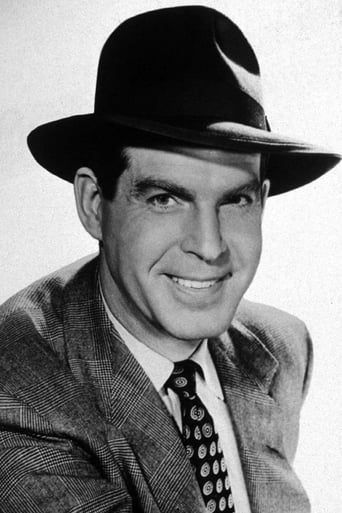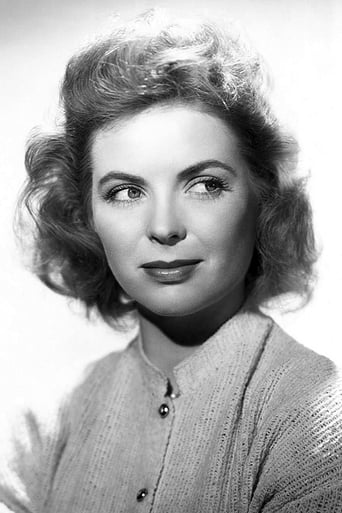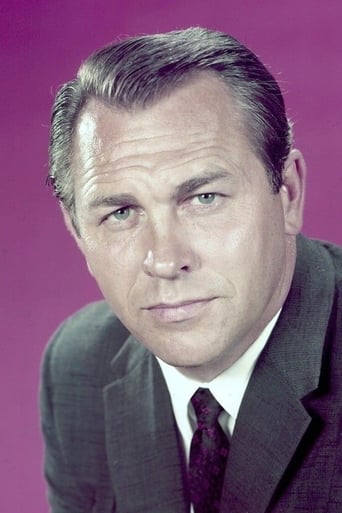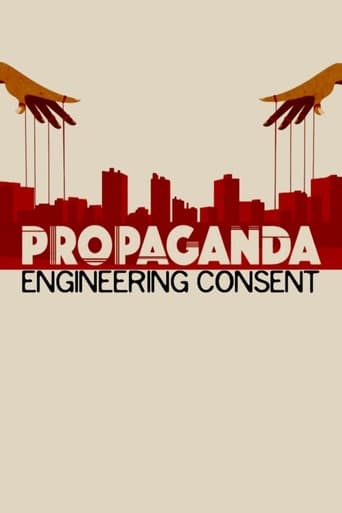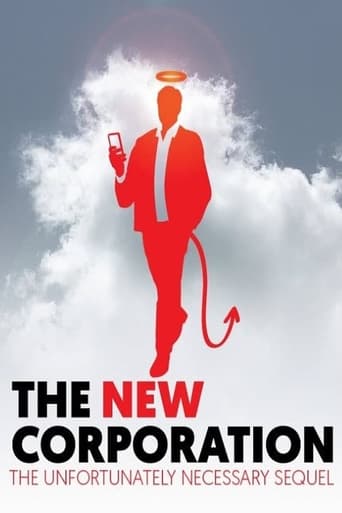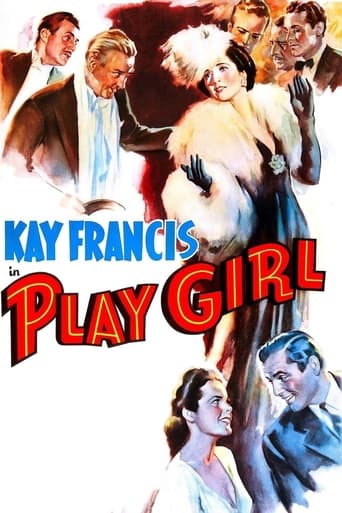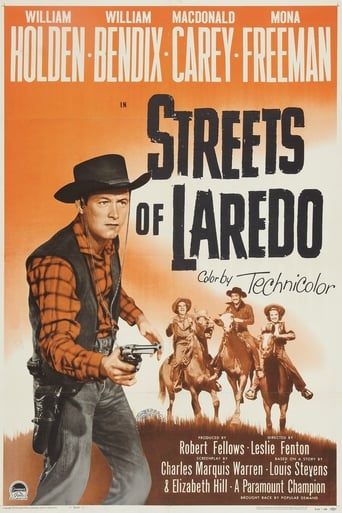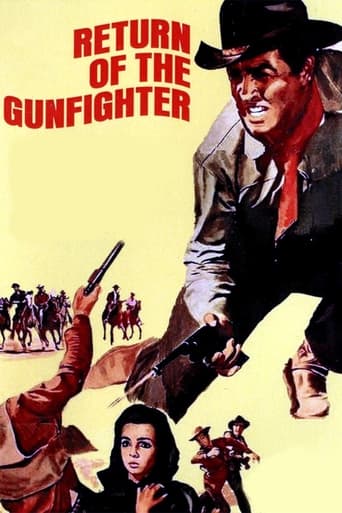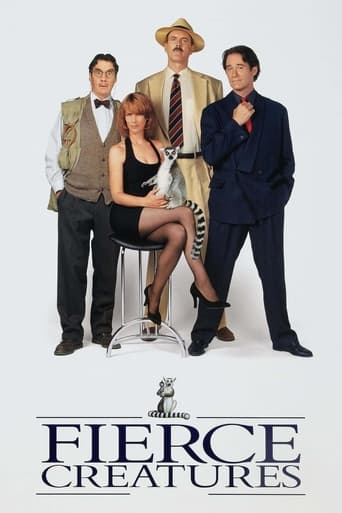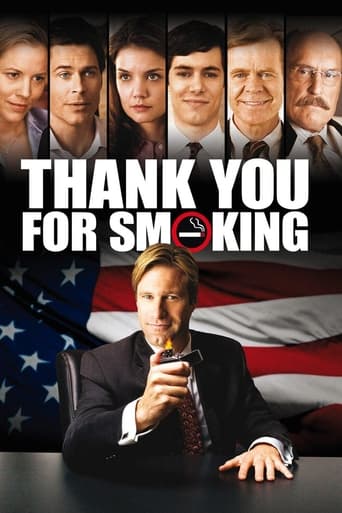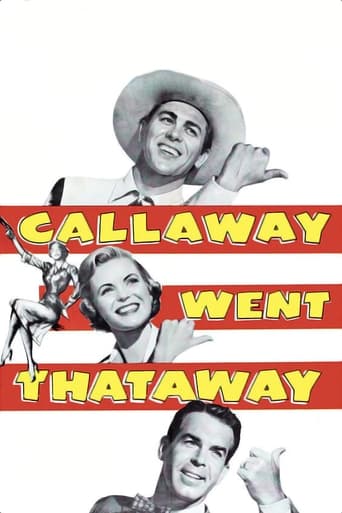
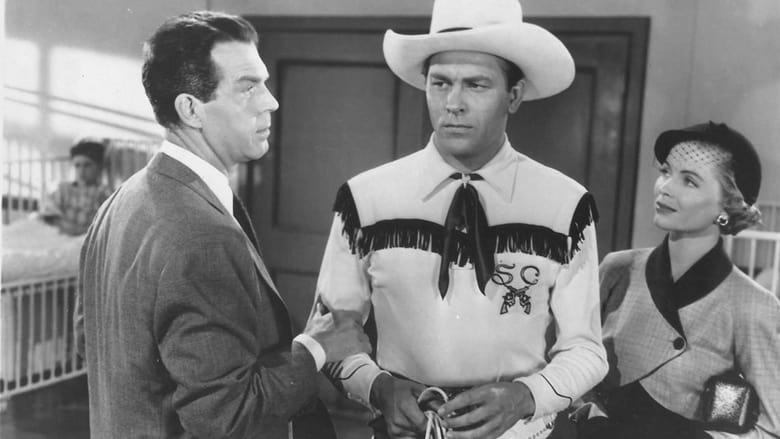
Callaway Went Thataway (1951)
Two smart marketing people resurrect some old films starring cowboy Smoky Callaway and put them on television. The films are a big hit and the star is in demand. Unfortunately no one can find him. When a lookalike sends in a photo, the marketing team hires him to impersonate Callaway. Things get sticky when the real Callaway eventually shows up.
Watch Trailer
Cast


Similar titles
Reviews
Howard Keel is Smoky Callaway, who made a lot of B Westerns some years ago. Now his movies are being shown on television and Smoky Callaway is everyone's hero, especially the kids who adore his wholesome character. The problem faced by two advertising people -- Fred MacMurray and Dorothy McGuire -- is that although there is a strong market demand for Smoky in the way of personal appearances and commercial endorsements, Good Ol' Smoky Callaway has disappeared into the woodwork whence he came. What can MacMurray and McGuire do? Well, what they can do is stumble upon an exact look-alike, a good-natured, cowboy in Duck Falls, Colorado, who's Zen character is interested only in the beauty of the sky and hills. He's making only $140 a month as a ranch hand and saves $130 of it. The other ten dollars "seems to slip right through muh fingers." But he can't resist two large a week for impersonating the elusive Mister Callaway so before anyone (outside the immediate circle of conspirators) know it, Stretch Barnes is in La La Land endorsing cereals and male extension products and exercisers designed to develop rock hard abs.Stretch is a little guilty about all that money though. He doesn't deserve it for impersonating someone else. So he sees a lawyer and sets up a non-breakable trust into which all his money will go except for a few grand for his ranch and, some day, his wife and lovely kiddies.Trouble is always around the corner in this sort of fairy tale. An unscrupulous rival advertising agent (Jesse White) locates Smoky Callaway in a louche dive somewhere in Latin America where he plays the guitar nightly and gets drunk daily at the El Chicolo.Smoky wastes no time getting back to where the money is. MacMurray and McGuire are frantic. They've lied to good old Stretch and told him that the real Callaway was dead -- which, for all they knew, might be the case. Now they must keep Callaway and Barnes separated while they hire a training team to get the truculent Smoky into shape, "physically, mentally, and morally." When he becomes human again, Stretch will be told the truth, replaced by Smoky, and sent back to the mountains he loves. It's a tough job. Smoky doesn't take his training regimen seriously, partly because he's got liquor stashed in the well, in hidden tree trunks, and liniment bottles -- and he's got martinis in the ink well.The team finally succeeds in drying him out but not improving his mentality. Smoky and Stretch finally meet and there is a fist fight, which Smoky loses. In a fit of pique he leaves for Latin America, and Stretch takes over the rest of the tour, making money that will mostly go to help kids who are poor and sick.A disclaimer at the end tells us that the movie was in no way meant to detract from the charitable civic efforts of real cowboy stars, whose movies were now beginning to show up and win audiences on TV. That must be a reference to guys like Roy Rogers, Gene Autry, Hopalong Cassidy, and Buster Crabbe, some of whom were much like Stretch Barnes, unpretentious and generous.It's funny, but not as funny as it might be, considering it was written, produced, and directed by Norman Frank and Melvin Panama and starred the first-rate light comedian Fred MacMurray. The situation itself was in no way original but the jokes aren't as funny as they might have been. Some ARE pretty amusing. As Smoky Callaway, Keel is drunkenly romancing a gal at the bar and mumbles to her, "You know, you remind me of a girl I knew in South America. Her name was Si, Senor." But it's all pretty light-hearted and enjoyable and is an innocent way to spend an hour and a half.
Thanks be to TMC for rescuing this minor gem from movie oblivion. Sure, kids have long since traded cowboy idols for computer screens, but the pointed humor surrounding Hollywood's money-making machine remains as fresh and timely as ever. MacMurray and McGuire are Hollywood hustlers looking to cash in on cowboy Callaway's renewed popularity via that novel entertainment gimmick, television. Meanwhile, kids everywhere are clamoring for more of their TV idol. The trouble is the actor has long since decided he prefers a drunken stupor to riding horseback and has disappeared from public view. What to do-- the hustlers are so close to the big bucks they can almost smell easy street. In a stroke of luck, a Callaway look-a-like turns up, and they hire him as an impersonator. The trouble is he's a straight-shooter from the boondocks, can't act, and couldn't care less about the Hollywood scene. But the two M's are real Tinsel Town slickers so things begin to work out. Then, however, the real Callaway (Keel, also) shows up and the fun really starts.Fine script from Panama and Frank. The barbs fly thick and fast, so you may need a scorecard to keep up. I love it when the stagehands and those folks who never get their names on screen show how to sabotage an arrogant movie star. Watch the flop Callaway takes executing one of those spectacular flying horse mounts. Though the humor is mainly aimed at Hollywood types and film-making generally, it's never mean-spirited, and we end up liking MacMurray even though he takes real advantage of the innocent "Stretch". Note too, the studio disclaimer at the end. That, no doubt, was to keep Hoppy happy since Cassidy's old films on TV were the movie's obvious inspiration. Being one of those kids that long-ago lined up to meet the real Hoppy, I can testify that he was stone cold sober and a nice guy, to boot. So as the disclaimer says-- the movie is intended merely in the spirit of good fun with no aspersions cast. And a lot of fun it is.
While CALLAWAY WENT THATAWAY isn't the deepest film I've seen, it sure was very perceptive and fun to watch. I also wonder if maybe although the film has a disclaimer saying it ISN'T based on any celebrity they REALLY were lampooning several of the big-name cowboy stars (such as Gene Autry who was a lot like the original Callaway)--a lot like how A FACE IN THE CROWD was based on Arthur Godfrey, though the studio strongly denied this.The film is about a cowboy movie star from a decade ago who has suddenly gained a new following with kids thanks to television--just like Gene Autry and Roy Rogers were re-discovered thanks to TV. As a result of his fame, the advertisers are anxious to find the actor who played Smokey Callaway so they can make more films as well as public appearances. The problem is that the actor was a big-time drinker and he just seemed to vanish after going on an extended bender in South America. Even a private eye (Jesse White) can't find the guy, so Dorothy McGuire and Fred MacMurray (who own the advertising agency) go in search of a double to pretend to be Callaway. In the process, they find a dead ringer--played by Howard Keel. The only problem is, eventually the drunk and nasty Callaway DOES resurface and they are in quite a quandary! The film has some nice comedic moments but late in the film it also becomes rather serious and romantic. Leonard Maltin's guide indicated the film was excellent until this change, but I actually liked the finished product. While not a great film, it was well worth seeing and quite perceptive about the private lives of some celebrities. Also, it's worth a look for some cameos of other stars playing themselves, such as Clark Gable and Dick Powell (among others).
A spoof on the massive western trend of Hopalong Cassidy and the like. When a western character comes into favor with the masses, a film company initiates a frantic search to find the original actor who portrayed that icon of wholesome American heroism, but when there are no leads, they decide on a good-hearted yokel who just so happens to resemble the cowboy of yore, and offer him a substantial salary if he will bring the character back to life for all the little kiddies who look up to him so admirably.By and by, an investigator manages to locate the original Callaway, who had taken residence in Mexico with some spicy senoritas and his chronic alcohol consumption. Now a rather grizzled version of his former self, he refuses to leave his lifestyle of excess, so the investigator plans on literally kidnapping him after he passes out to catch a ship back to the states. He reluctantly agrees to assume his former role, much to the chagrin of the female chaperon accompanying the new cowboy, as she takes quite a fancy for him as he does with her, who after traveling across the country, become, shall we say, 'very well acquainted'. A fight eventually ensues between the cowboys, and the real one wins out over the drunk.Amusing scenes include: in an effort to bring the drunken cowboy back to shape, he hides bottles of booze in various locations throughout this health ranch, including in a well bucket, and in a rock while jogging out on the trail.The well-meaning impersonator manages to gain possession of all of the money the character had been generating up to that point and sets up a fund for clinically ill children, after feeling deeply guilty since a stern woman admonished him about their conditions. He eventually grows to embody the Callaway icon, and assumes the role whole-heartedly.


